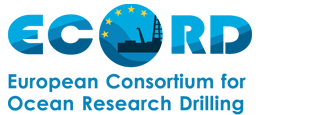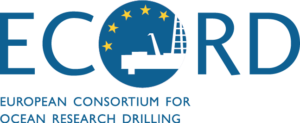WHAT IS IODP?
IODP stands for the International Ocean Discovery Programme, an international collaborative programme supported by 24 countries, to explore the oceans, under the 2013 – 2023 Science Plan “Illuminating Earth’s Past, Present and Future”.
Two dedicated vessels, JOIDES Resolution and Chikyu together with mission-specific platforms provide the scope to work in all water depths and all environments from ice-covered, shallow water to deep oceans and trenches.
WHAT IS ECORD?
ECORD stands for the European Consortium for Ocean Research Drilling. This is the management structure that supports Europe-based scientists and the ECORD Science Operator, providing access to, and funding for, IODP expeditions.
WHAT IS ESO
ESO stands for the ECORD Science Operator, and is formed of a consortium of European institutions who work together to provide the operational capabilities for ECORD funded expeditions. ESO provide expertise and support from initial contracts to geochemists, drilling experts, petrophysical activities, core curation to media relations, to help you carry out your science.
WHAT ARE MISSION-SPECIFIC PLATFORMS (MSP)?
Mission-specific platforms (MSP) are unique in that they use a wide range of vessels to carry out speci c scienti c drilling. With the operational capabilities of the dedicated drilling vessels JOIDES Resolution and Chikyu, IODP required some way to tackle those burning scientific questions in places the two drillships couldn’t reach, namely shallow and ice-covered waters. The solution was the MSP concept. We take the best ship for the job and modify it to suit the science, fitting drilling derricks onboard, putting on containerised labs and sometimes even cutting a hole into the ship to pass the drillstring through!
WHERE DO WE DRILL AND WHO DECIDES WHAT WE EXPLORE?
We work all over the world! The hypothesis driven science questions proposed by scientists from around the world, aligned with the overall science themes of IODP, are what drive our expedition choices. Each proposal is assessed by a range of advisory panels, and selected proposals are passed onto the most relevant platform operator for scheduling.
HOW ARE MSPs FUNDED?
IODP expeditions, including MSPs, are funded by national governments investing in scientific research. We are not aligned with industry or oil and gas exploration.
WHY DO YOU HAVE AN OFFSHORE AND AN ONSHORE PHASE?
Mission-specific platform expeditions operate a different vessel for every expedition. As we work from a series of mobile 20-foot containers, fitted out as offices or laboratories, we are limited by space and therefore the science that we can do offshore. As a result we collect cores and do any ephemeral measurements offshore, then hold an Onshore Science Party at the IODP Bremen Core Repository, MARUM, Germany. This enables all science party members to get together and split and document the cores prior to sampling them for their post-expedition research.
HOW CAN I ACCESS DATA FROM AN EXPEDITION?
The history of collaborative ocean drilling goes back to 1968 and the start of the Deep Sea Drilling Project. All cores collected over these ve decades are housed in one of three IODP core repositories based in the US, Germany and Japan. Anyone can request samples from these cores or access the expedition proceedings which detail all shipboard generated data and results from expeditions.
HOW CAN I GET INVOLVED?
There are many different ways to become involved with ECORD and IODP:
- Write your own drilling proposal.
- Apply to sail as a scientist.
- Host a MagellanPlus Workshop, designed to develop new projects.
- Host, or be one of our Distinguished Lecturers who will talk about IODP discoveries.
- Become a panel member helping the decision making process within IODP.
- Attend one of our ECORD Summer Schools or Training Courses.
- Join ECORD as an Educator through the School of Rock initiatives.
CAN YOU HELP WITH RESEARCH COSTS?
ECORD offers research grants for research related to scientific ocean drilling samples. Applications can be made through the ECORD Science Support and Advisory Committee (ESSAC). In addition, national o ces also support scientific research for their in-country researchers.

